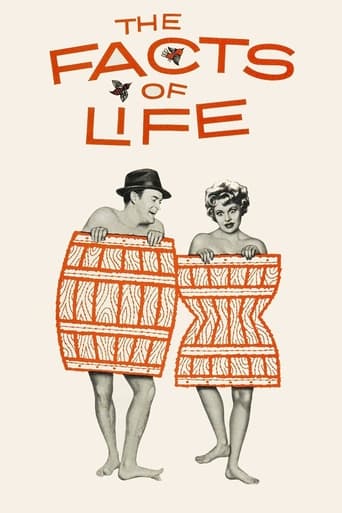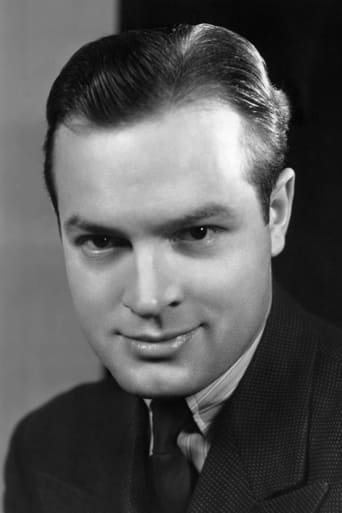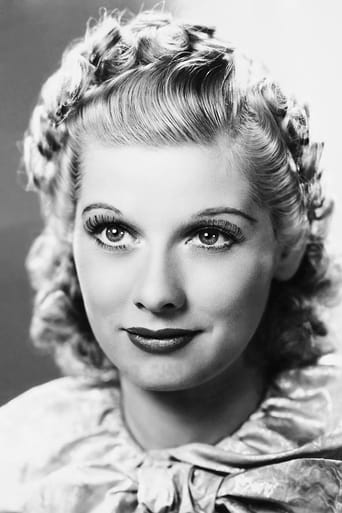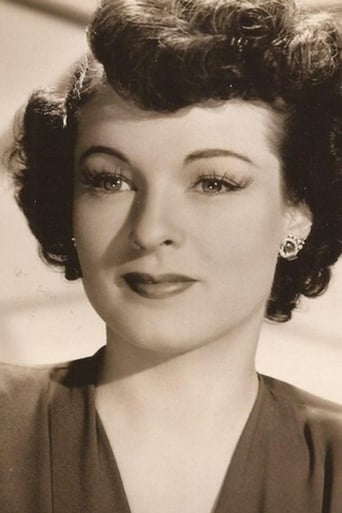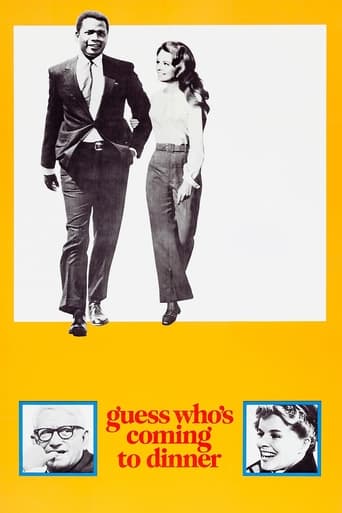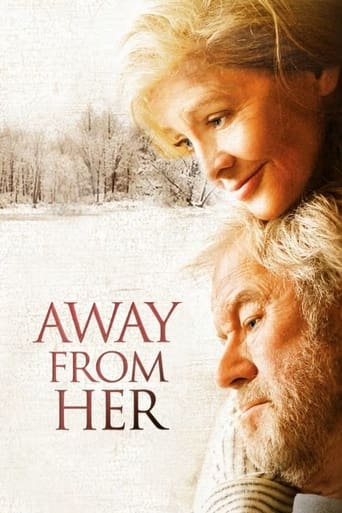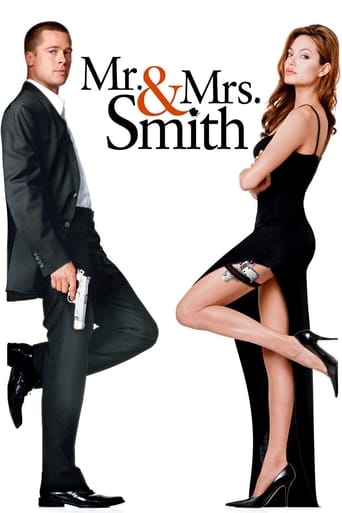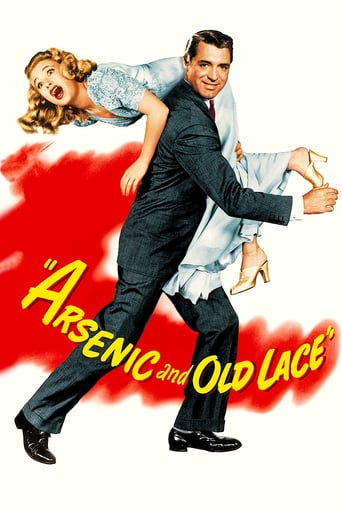The Facts of Life (1960)
Middle-class suburbanites Larry and Kitty grow bored with their lives and respective marriages. Although each always found the other's manner grating, they fall in love when thrown together--without their spouses--on vacation. On returning home they try to break things off, only to grow closer. A holiday together will finally settle whether they should end their marriages.
Watch Trailer
Free Trial Channels
Cast


Similar titles
Reviews
It was OK. I don't see why everyone loves it so much. It wasn't very smart or deep or well-directed.
There are moments that feel comical, some horrific, and some downright inspiring but the tonal shifts hardly matter as the end results come to a film that's perfect for this time.
Let me be very fair here, this is not the best movie in my opinion. But, this movie is fun, it has purpose and is very enjoyable to watch.
One of the film's great tricks is that, for a time, you think it will go down a rabbit hole of unrealistic glorification.
Do not adultery commit, Advantage seldom comes of it.Thus wrote the 19th century poet A H Clough in "The Latest Decalogue", his satirical version of the Ten Commandments. Clough may have meant these words satirically, but they sum up fairly accurately the way in which his literary contemporaries treated adultery in their works. There was an unwritten law to the effect that writers could deal with the subject on condition that they made it clear that advantage seldom comes of it. Thus Flaubert made Emma Bovary poison herself and Tolstoy had Anna Karenina jump under a train, as a salutary warning to their readers that they disregarded their marriage vows at their peril. This moralistic attitude to marital infidelity survived well into the twentieth century, and the advent of the Production Code meant that it found a new home in the motion picture industry. Indeed, it seemed to survive there long after it had gone into a decline in the literary world. By the 1950s, however, even Hollywood scriptwriters were starting to take a more liberal attitude towards the Seventh Commandment, the Marilyn Monroe vehicle "The Seven Year Itch" being a case in point. Admittedly, nobody actually commits adultery in that movie, but the main male character certainly considers doing so, and the subject is treated in a generally light-hearted manner, not as the occasion for some heavy-handed moralising. "The Facts of Life" was made in the opening year of the following decade, and like a number of films from the period such as "Where the Boys Are", also from 1960, it is very much of its period, marked by a coyly suggestive attitude to sex which would have been too suggestive for 1940 or 1950 and too coy for 1970 or 1980. Even the title derives from a sexual euphemism; "Do your children know the facts of life?" is a way of asking "Do your children know the facts of human sexuality?" Whereas "Where the Boys Are" dealt with love and sex among young single people, this film is a comedy of love and adultery (or at least attempted adultery) among the middle-aged middle classes. Three California couples, the Gilberts, Masons, and Weavers, have a long-standing agreement to go away on holiday together each year. One year fifty-something Larry Gilbert and forty-something Kitty Weaver unexpectedly find themselves alone in Acapulco after their respective spouses are unable to travel with them and the Masons are taken ill. Even more unexpectedly, Larry and Kitty, who have previously not cared for one another very much, fall in love. The rest of the film chronicles their attempts to consummate their relationship. As in "The Seven Year Itch", nobody actually ends up in bed with anyone other than their lawful partner, but in Larry and Kitty's case that's not for want of trying, and the film certainly does not take a moralistic attitude towards their antics. As I said, the film would have started to look a bit old-fashioned even by 1970, and today, more than fifty years after it was made, its rather twee attitude to sex looks hopelessly antiquated. The plot is horribly artificial and unrealistic. The scriptwriters try to exploit that old romantic comedy chestnut- old even in 1960- about two people who start off by disliking each other and end up madly in love, but here it just does not work. In most films which rely on this plot device the initial dislike is something momentary, based upon a mistaken first impression, which is later corrected, allowing love to develop gradually. Here, however, Larry and Kitty go from hating to loving one another almost in the blink of an eyelid. Moreover, as they appear to have known each other for a considerable length of time, their mutual dislike was presumably based upon something more than a temporary misunderstanding. Lucille Ball, in her late forties, was still attractive enough to make a convincing romantic comedy heroine. (She was actually nominated for a Golden Globe for "Best Actress – Comedy"). Bob Hope, however, comes across as a bit dull and lacking in charisma, and never makes us understand what Kitty sees in Larry. Hope was always better as a comedian than as a comic actor, and does not really shine in a film like this one which depends more upon comic situations than upon comic dialogue. The film as a whole was reasonably well received when it came out in 1960, and was nominated for five Academy Awards, but it has dated badly, even in comparison with other comedies of the era. Compared, say, with something like "The Apartment" (also from 1960, and which also takes illicit sexual relationships as its theme), "The Facts of Life" comes across like an over-extended episode from some long-forgotten television sitcom. 4/10
In some ways, this is like an "I Love Lucy" show with cursing, lots of drinking, and centering on adultery. Ball and Hope work well together.The plot begins inauspiciously: We see Hope doing a comedy gig as MC at a local event. We hear Ball's thoughts about how crass and unfunny he is. (And he -- this character, not Hope himself -- is.) Because of circumstances that throw them together, however, they are very soon sexually and romantically involved with each other.If one can get past this, which I could, the movie is sophisticated (well, for its time) and often funny. It was probably a courageous move for both of them to step into such a risqué plot.The supporting cast is good. Ruth Hussey plays Hope's wife. As always, she is good. But seeing her is sad: Though she looks fine, her voice had aged badly. Irene Dunne's did too. Though I am crazy about Dunne, her last couple movies are painful for this reason. Hussey sounds like an elderly woman, which she really was not. Ball's voice had gone the opposite direction: She speaks almost in the basso profondo of her later television series.If this turns up, give it a try. It's surpassingly good.
This movie surprised me. I really enjoyed it. Lucy is stunning as a glamor star. She gets the soft focus and lighting, the glamor hair and makeup, but the showstopper is the glamor wardrobe. I've never seen her look more beautiful.I did not know that Lucy had made it so far in her movie career as to be able to star as a glamor girl, opposite Bob Hope yet. Another notch on the resume of this fascinating woman.My wife and I had just been discussing Lucy's talents as a straight actress and by coincidence this movie came on the next day. I had the opinion that Lucy was best in comedy and was not quite right in a straight role. This movie proved me wrong on that! She is convincing and when she kissed Bob I really believed it.Bob is also great. His comedy style here is more subtle than usual, playing funny bits off in a straight style without the usual hamming. The bit with the hankie made me belly laugh.The subject matter of this movie is similar to other movies of the early 60s as the sexual revolution was just starting...all clean and above board on the surface, yet doing their best to titillate us with sexual situations and innuendo. As I said in my review of Bob's "I'll Take Sweden," I find this juvenile and boring. There's no shock value left by now, so it falls flat. However, this movie tackles more serious subjects than simply titillating sex, namely the subjects of infidelity, marriage, and marital boredom. That is more interesting and even in 2005 I found the subject matter moving and thought-provoking.The script is tight and witty, with good dialog. The plot is also more or less water tight with plausible motivations.Good stuff....worth watching.
This surprising film was shown on TCM recently. Not having seen it, and not having other choice, we decided to take a look, and quite frankly, it was a surprise. The film, directed by Melvin Frank and co-written with his partner, Norman Panama, shows two stars that endeared themselves to the American public at their best.The story is just a pretext and a vehicle for the stars. The plot kept reminding us of "A Guide for the Married Man", but that's all the comparison, because one has nothing to do with the other. In fact, this is a film made in 1960 when nothing too risky would be tackled for the screen, yet, it presents two straying adults who suddenly find an attraction where dislike existed before.Bob Hope was the surprise in the movie. He doesn't have a chance for uttering his one liners, as the script doesn't allow it. It was one of the best films in which he appeared, in our humble opinion. Lucille Ball was an excellent comedienne, and she shows it on this film.The interesting supporting cast makes the best with the material they were given to play. The excellent Ruth Hussey is seen as Bob Hope's wife. Don DeFore, plays Lucille's husband. Louis Nye is also seen in the film.The film is light and will charm anyone wanting to spend some time in the company of some of America's best comic talent of the past.

